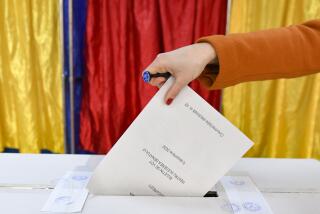Europeans Dislike Bush’s Foreign Policy, Poll Finds
- Share via
WASHINGTON — More than 70% of people surveyed in four major Western European countries believe that President Bush is pursuing a unilateralist foreign policy that bases decisions solely on U.S. interests, ignoring the wishes of the rest of the world, a poll conducted by the Pew Research Center shows.
The survey of nearly 4,000 adults in Britain, France, Germany and Italy, released Wednesday, demonstrates the high hurdle Bush must overcome to persuade the European public--and, most likely, the governments of Washington’s closest allies--to back U.S. initiatives, especially on nuclear arms and global warming.
The view from Europe mirrors that of Democratic Party leaders in Congress, who accuse the Bush administration of pursuing a go-it-alone foreign policy that undermines key alliances.
Although the poll results were not particularly surprising in light of the criticism Bush has received from European newspapers and politicians, the numbers show just how little trust the U.S. president enjoys.
When respondents were asked whether Bush makes decisions based entirely on U.S. interests or takes Europe into account, the percentages answering the former versus the latter were: France, 85-8; Germany, 73-18; Italy, 74-15; and Britain, 79-14.
The numbers were almost as striking when respondents were asked whether they approved or disapproved of Bush’s foreign policy, without reference to any specific issue. Approval ranged from 16% in France to 29% in Italy. Disapproval ranged from 65% in Germany to 46% in Italy.
By contrast, a similar poll during President Clinton’s tenure showed that European respondents overwhelmingly approved of his foreign policy, with majorities of more than 66% in all four countries.
About 75% of respondents in France, Germany and Britain said Bush understands Europe less than most of his predecessors did. In Italy, 53% held that view.
On specific issues, almost nine out of 10 respondents in each of the countries disapproved of Bush’s decision to pull out of the 1997 Kyoto Protocol, an agreement to combat global warming. And majorities ranging from 65% in Italy to 83% in Germany opposed Bush’s proposal to develop a missile defense system if, as expected, it requires scrapping the 1972 Antiballistic Missile Treaty.
However, Bush’s decision to keep U.S. troops on peacekeeping duty in Kosovo, a province of Serbia, Yugoslavia’s dominant republic, enjoyed support across the board, as did his free-trade policies.
Despite their doubts about Bush and his policies, a solid majority of the Europeans said the United States and Europe continue to be close and effective allies. In each country, fewer than a quarter of the respondents said differences between the U.S. and Europe have widened in recent years.
But many Europeans surveyed showed little confidence in Bush’s overall ability. In Britain, 30% of respondents expressed either a great deal or a fair amount of confidence in Bush, compared with 57% who indicated little or no confidence. In Italy, it was 33% to 59%; in France, 20% to 75%. Only in Germany did a majority--51% to 46%--express confidence in Bush.
On the confidence question, Bush fared only slightly better than Russian President Vladimir V. Putin, who commanded the confidence of 26% in Britain, 23% in Italy, 14% in France and 41% in Germany.
The poll was co-sponsored by the International Herald Tribune and the Council on Foreign Relations.
In a commentary distributed with the poll results, former State Department official Morton H. Halperin, now a senior fellow of the council, said that as a result of the opinion represented by the poll, “European governments are unlikely to yield to administration pressure to go ahead with a missile defense system if it leads to terminating the ABM treaty. And it suggests that, if any of these governments do go along, the long dormant European antinuclear movement might come to life with a vengeance.”
More to Read
Get the L.A. Times Politics newsletter
Deeply reported insights into legislation, politics and policy from Sacramento, Washington and beyond. In your inbox twice per week.
You may occasionally receive promotional content from the Los Angeles Times.










